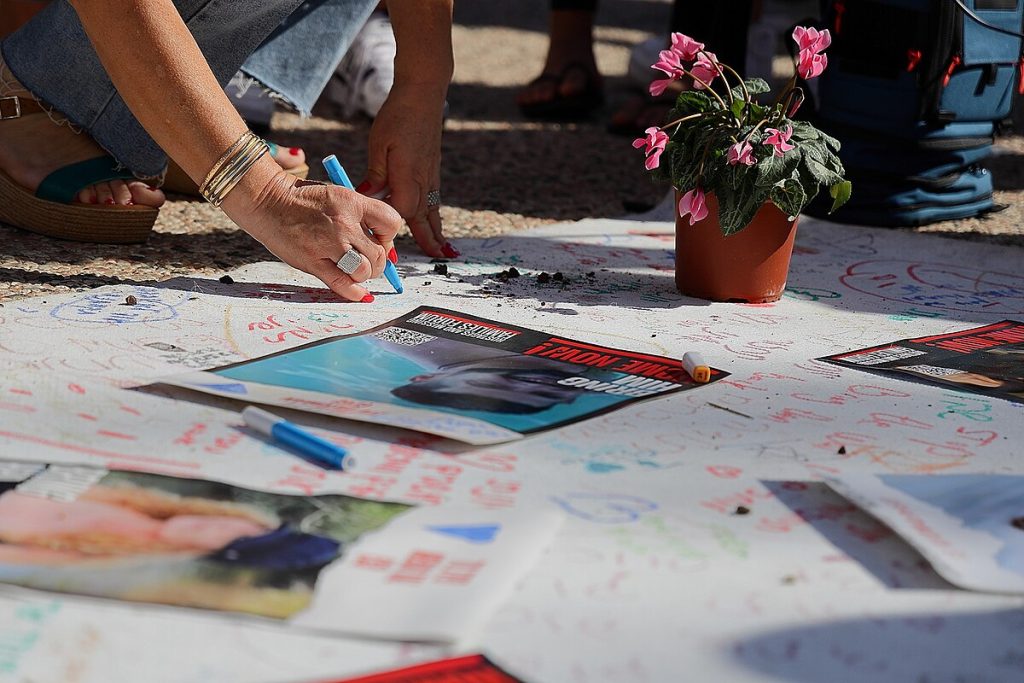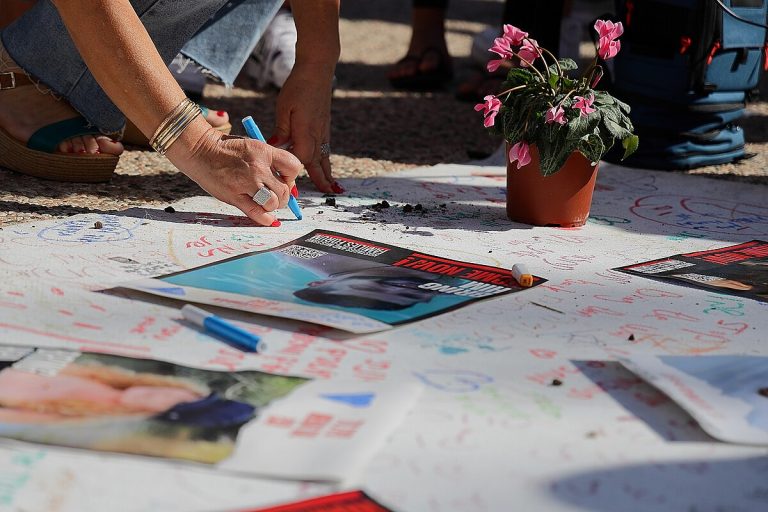Being half Jewish and half Palestinian has an undoubted benefit: it teaches a young girl that peace is not an unattainable dream and that any marriage, no matter how complicated, can be saved. But coexistence between peoples is rather like a family meal; It can only be enjoyed if the rules are followed.
The Israeli-Palestinian conflict is an apt example of the inherent fragility of the norms governing global affairs. Because international law is inherently discretionary, it is not at all important whether the rules of the game are followed or not. State control over the tools the world has developed to promote peace turns everyone's dinner into a tragedy.
The dynamics between Hamas and Israel, in particular, seek alternative spaces for Al Qaeda and are fueled by stories that distort the facts. Both sides use people's suffering to advance their own causes.
Hamas distorts the nature of the fighting by imbuing it with a religious character that does not accurately reflect the Palestinian position. It is important to remember that Palestinians practice more than one religion; Since everyone is monotheistic, the only thing that unites them is the oneness of the God in whom they believe, and the name by which they address Him. Before Hamas, whose approval rating in opinion polls until the war was less than 30%, Palestinian politics was known for its secularism.

Writing to kidnapped people. Image: Lizzie Shannan, via Wikimedia Commons
On the other hand, the Israeli government uses Jewish history to justify ethnic cleansing. There are two things going on here: First, the world is encouraged to ignore the fact that the Palestinian people have been under occupation for 75 years; Second, the tragedy of October 7 was linked to the Holocaust to justify the massacre of another people. Not only does this ignore a common understanding of historical causality — and thus violates Jewish tradition, which is intrinsically linked to the practice of looking back through time to understand the present — but it also links all Jews to, and thus exposes, Israel’s unjust and illegal behavior. To revive anti-Semitism.
Law and context
The complexity at the heart of this conflict makes many reduce the issue to a game in which one must choose one side, without understanding what is essential: for the international community to take these two peoples by the hand and guide them towards a coexistence governed by justice. Rules that they must accept and live by, like it or not. But for this coexistence to be possible in the first place, the humanity of every individual on both sides must be recognized.
What happened on October 7 must be strongly and categorically condemned. International humanitarian law does not prohibit resistance, nor does it prevent any state from defending itself, within the limits of humanity, distinction, precaution and proportionality, all of which aim to limit the impact of war on civilians. But it imposes strict restrictions on any party participating in an armed conflict.
Warring parties are prohibited from using unlimited force, and must minimize suffering at all times. Right to Bello, or laws during war, apply regardless of the logic or justice of the issues they are fighting for, and attempt to protect victims of armed conflicts regardless of loyalty. As a result, civilians must always be protected in all circumstances.
This did not happen on October 7. Hamas attacks caused civilian casualties, including the killing of women, children, and the elderly, and the destruction of non-military targets in residential villages. By kidnapping civilians, Hamas violated the principle of distinction, which prohibits the taking of civilians hostage. Even in the case of prisoners of war, the principle of humanity must be respected in the treatment of detainees. The killing and ill-treatment of civilian hostages by Hamas constitutes a complete defiance of these principles.
But it is impossible to discuss the October 7 Law without referring to some other basic facts of international law. Military occupation is understood as a transitional situation and there are rules governing the behavior of the occupier. Above all, the occupier must guarantee the sovereignty of the occupied country. This principle interacts with human rights and associated treaties to produce a number of obligations on the occupying state with regard to protecting the rights of the local population.
These obligations include the prohibition of taking actions that would significantly affect the legal system, as well as the economic, political and social conditions in the occupied territory. The occupying state must supervise the orderly conduct of civilian life in the territories under its control in order to protect the local population.
For many years, Israel has claimed that the Gaza Strip is not under occupation because it has been free of Israeli colonies since 2005. International law, on the other hand, understands the situation in the Strip quite differently: Israel controls its land borders and maritime trade. Air traffic, all imports and exports, and all human movements. As a result, international law considers the Gaza Strip to be under Israeli occupation.
What António Guterres was trying to convey when he said that the events of October 7 did not occur in a vacuum is that by putting the events in context, we can understand their origins, appreciate their complexities, and plan strategies to reverse negative trends or reinforce positive trends. Explanation does not mean conferring legitimacy, and in this case it does not reduce the seriousness of Hamas' crimes or provide justification for them.
Rights and responsibilities
We must be careful about analogies to the past that aim to address feelings and anxieties that do not acknowledge the complexities inherent in modern history. The charge of anti-Semitism, if attributed to any criticism of the behavior of the Israeli state, may amount to a restriction on freedom of expression.
Yad Vashem President Danny Dayan said he was horrified “to see members of the Israeli delegation to the United Nations wearing the yellow star,” adding that “the yellow patch symbolizes the helplessness of the Jewish people and their being at the mercy of the people.” Others. Today we have an independent country and a strong army.
The truth is that an Israeli today is not a Jew a century ago. All conditions have been created for Jews to exercise their dignity with their heads held high before the rest of the world. Israel is a nuclear power supported by a global superpower. But power also comes with responsibility.
Being the master of one's destiny is not easy; It confers not only the right to wage war, but also the duty to think clearly and critically about what kind of war it is, whether it is morally legitimate, and, in the case of Israel, whether it aims to strengthen or weaken the values on which the war was based. Which consolidated its presence for 75 years. It would be a tragedy if the principles that led to the post-Holocaust constitution of the State of Israel failed to prevent genocide against other populations.
Between October 7 and November 2, Israel dropped more than 25,000 tons of explosives on the Gaza Strip, the equivalent of two nuclear bombs over an area of 360 square kilometers (less than half the size of Hiroshima). Furthermore, Israel has been accused of using internationally illegal weapons in its attacks on Gaza, especially cluster bombs and phosphorus, which cause severe second- and third-degree burns.
The death toll has so far exceeded 12,000, and the political comments of many military and government figures show genocidal intent: the desire to demolish the Strip and liberate Israel from the Palestinians has been declared several times. In recent weeks, Israeli media published documents proving the government’s insistence on evacuating the Gaza Strip and forcibly deporting all Gazans to Sinai. Israel has now ordered the evacuation of the southern half of the Gaza Strip.
Fueling extremism
Again, there is a lack of insight. The violence is not only brutal and illegal, it will have far-reaching effects on many levels.
It has the potential to reawaken anti-Semitic attitudes in the wake of growing global outrage over the atrocities committed by Israel against Palestinians in Gaza, as well as radically reverse the Israeli process of normalization and integration in a region where the Jewish state must coexist with countries that have long been anti-Semitic. hostile.
As happened in Bush's war, the Israeli response pits Western values against Islamic values, which fuels extremism at the expense of moderation. Escalating the conflict through the deliberate humiliation of certain ethnic and religious identities will only lead to further extremism.
The scope of this war is currently expanding. It is not necessary to include regular armies. What should frighten governments now is not so much violence between sovereign states, but the resentment of moderates who have been abandoned and humiliated by the shameful silence of their elected leaders and then easily exploited by extremist forces. Instead of depriving extremists of oxygen, Israel, Palestine, and the West in general help them spread.
The guidelines that the international community has given itself are very important. But unless they are applied universally, and unless we are prepared to respect and protect them always, without exception, the fundamental principles of the United Nations Charter are doomed to lose their meaning.

